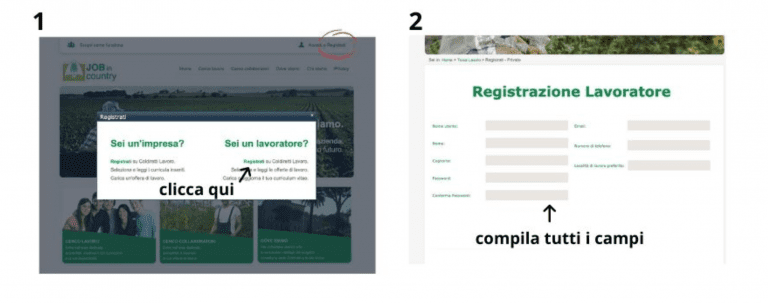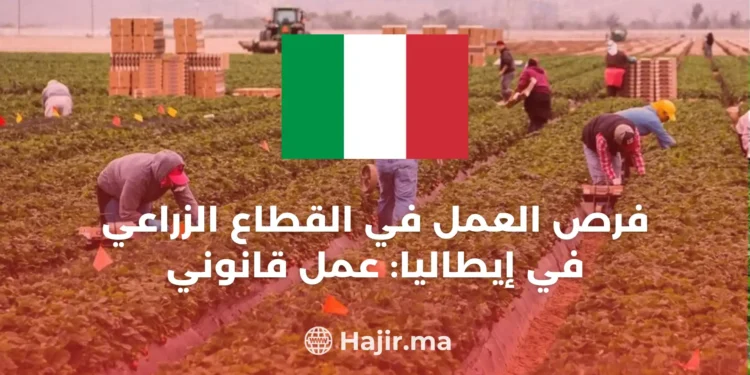Are you considering working in the agricultural sector in Italy, but you’re unsure about how to navigate the job market and protect your rights? You’re not alone. Many foreign workers seek job opportunities in Italy’s agriculture industry, particularly in the harvesting of fruits and vegetables. In this article, we’ll guide you through the process of finding legal work in this sector and offer tips to guard against exploitation.

Italy’s agricultural sector offers a variety of job opportunities for foreign workers, especially during the harvesting seasons. However, it’s essential to understand the process of finding legal work in this field and safeguarding your rights.
The Challenge of Seasonal Work
Impact of Border Closures
The COVID-19 pandemic has disrupted the flow of foreign labor into Italy’s agricultural sector due to border closures. Seasonal workers who usually flock to Italy for employment have faced hurdles in reaching the country. In response, various stakeholders are working to promote and incentivize agricultural employment.
Promoting Agricultural Opportunities
Coldiretti’s Initiative
One significant initiative in this regard is spearheaded by Coldiretti, Italy’s primary agricultural association. Coldiretti has developed a platform to bridge the gap between farms seeking labor and individuals searching for agricultural work.
Where to Look for Jobs
Employment in the Field – Coldiretti
To access the opportunities offered by Coldiretti’s platform, follow these steps:

- Register on the “Registrazione Lavoratore” page, providing your personal details such as your name, chosen username, phone number, and email address. Email communication is vital, so make sure to create an email account if you don’t have one.
- You can also upload your CV, allowing potential employers to review your work experience.
- Actively search for vacancies on the “Cerco Lavoro” page, specifying your preferred region to narrow down job listings.

Agrijob – Confagricoltura
Agrijob, another platform for finding agricultural employment, operates under Confagricoltura. While it doesn’t display job listings, you can register on their “Sei un lavoratore” page. Representatives from the Confagricoltura office in your area will contact you when suitable job opportunities arise.

CIA – Agricultori Italiani
For more job-seeking options, consider registering on the CIA-Agricoltori Italiani platform. Provide your personal information and details about your agricultural experience to increase your chances of being contacted for job opportunities.

Internet Search Strategy
Suppose you want to explore additional job offers in your specific region or city. In that case, you can conduct an internet search using keywords such as “agricultural job” followed by the name of your region or city, e.g., “agricultural job Tuscany” or “agricultural job Arezzo.” Some companies may welcome applicants without prior agricultural experience, so don’t hesitate to apply.
Inclusivity Matters
It’s worth noting that some employers seek experienced agricultural workers, while others are open to hiring newcomers to the sector. Therefore, even if you lack prior experience in agriculture, don’t hesitate to pursue job opportunities.
Ensuring Legal Work
The Importance of Contracts
All the opportunities you find on these platforms and employment websites are for legal work, not illegal employment. However, it’s crucial to secure a written contract with your employer. If you’re offered work without a contract or if your employer fails to uphold working conditions, reach out to a union or association that supports workers.
Seeking Help from Unions and Associations
Here are some union links and associations that can assist you:
- FLAI- CGIL: Federazioni Lavori Agroindustria (FLAI) operates within CGIL and specializes in defending the rights of workers in the agricultural and industrial sectors.
- CISL: This prominent union advocates for workers’ rights and offers resources through its regional offices.
- UILA: The Unione Italiana Lavoratori Agroalimentari focuses on workers in the agriculture and food sector. Locate the nearest office to you for assistance.
- Progetto Diritti Onlus: This association provides legal services with delegations in Lazio and Sicily. Reach out if you need legal support.
Useful Contacts and Helplines
If you ever find yourself in a difficult situation or need guidance, consider contacting the following helplines:
- Anti-Trafficking and Labor Exploitation Helpline: Dial 800 290 290 (Lycamobile – 3427754946) for assistance with issues related to illegal work or exploitation.
- Arci Toll-Free Number: Call 800905570 (Lycamobile – 351 1376335) for information and assistance regarding the rights and obligations of refugees and asylum seekers.
In conclusion, while finding legal work in Italy’s agricultural sector may present its challenges, it’s possible with the right resources and information. By following the steps outlined in this article and seeking support from unions and associations, you can embark on a rewarding agricultural career in Italy. Remember to prioritize your rights and well-being throughout your employment journey.
For more details tap hehttps://jobjoj.com/careers/re
Frequently Asked Questions (FAQs)
- Is it possible to find agricultural work in Italy without prior experience in the sector?
- Yes, some employers are open to hiring individuals without prior agricultural experience. It’s essential to explore job opportunities and present your skills and willingness to learn.
- What should I do if my employer does not provide a written contract or fails to uphold working conditions?
- Contact a union or association that specializes in workers’ rights, such as FLAI- CGIL, CISL, or UILA. They can provide guidance and support.
- Are the job opportunities listed on platforms like Coldiretti and Agrijob legal and safe for foreign workers?
- Yes, these platforms primarily offer legal job opportunities in the agricultural sector. However, always ensure you have a written contract with your employer to protect your rights.
- Can individuals without a residence permit use these platforms to find work?
- No, these platforms are typically accessible to individuals with a valid residence permit. They do not offer jobs that provide residence permits.
- **Where







je charge donné les travail donne cada pour les choforre done traspour
I want to come to you as an escape from my country’s oppression of me